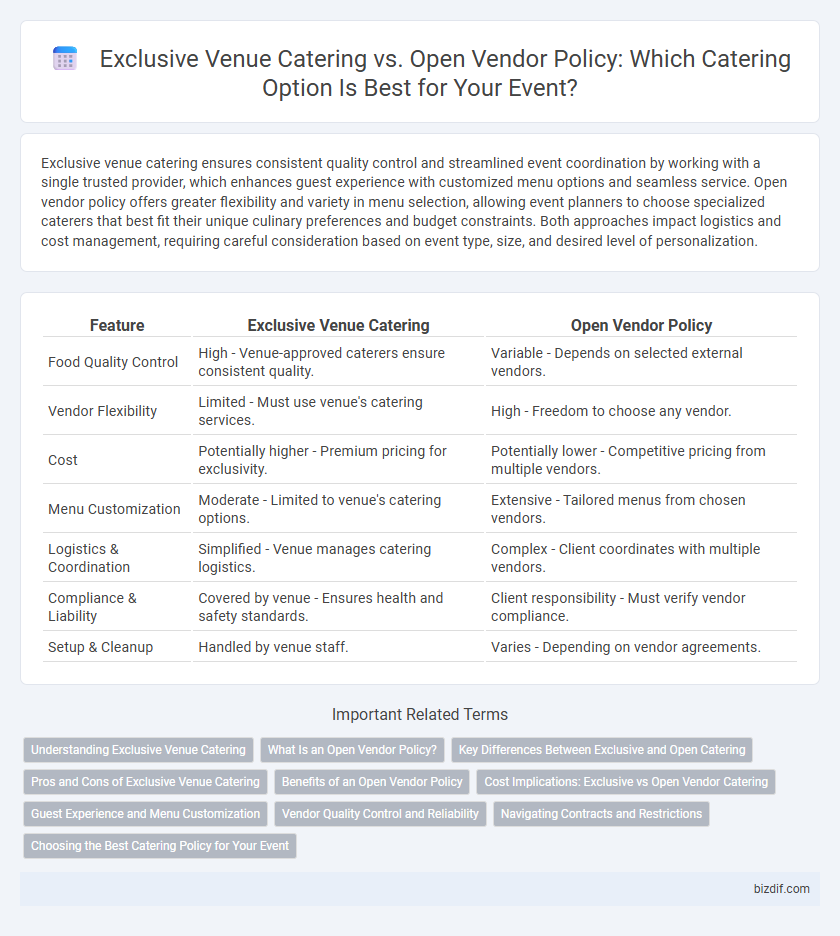Exclusive venue catering ensures consistent quality control and streamlined event coordination by working with a single trusted provider, which enhances guest experience with customized menu options and seamless service. Open vendor policy offers greater flexibility and variety in menu selection, allowing event planners to choose specialized caterers that best fit their unique culinary preferences and budget constraints. Both approaches impact logistics and cost management, requiring careful consideration based on event type, size, and desired level of personalization.
Table of Comparison
| Feature | Exclusive Venue Catering | Open Vendor Policy |
|---|---|---|
| Food Quality Control | High - Venue-approved caterers ensure consistent quality. | Variable - Depends on selected external vendors. |
| Vendor Flexibility | Limited - Must use venue's catering services. | High - Freedom to choose any vendor. |
| Cost | Potentially higher - Premium pricing for exclusivity. | Potentially lower - Competitive pricing from multiple vendors. |
| Menu Customization | Moderate - Limited to venue's catering options. | Extensive - Tailored menus from chosen vendors. |
| Logistics & Coordination | Simplified - Venue manages catering logistics. | Complex - Client coordinates with multiple vendors. |
| Compliance & Liability | Covered by venue - Ensures health and safety standards. | Client responsibility - Must verify vendor compliance. |
| Setup & Cleanup | Handled by venue staff. | Varies - Depending on vendor agreements. |
Understanding Exclusive Venue Catering
Exclusive venue catering requires clients to use the venue's preferred or in-house caterers, ensuring consistent quality and streamlined event coordination. This policy often includes access to specialized menus, experienced staff familiar with the venue's layout, and adherence to specific health and safety standards. Understanding these benefits helps clients make informed decisions about balancing control and creativity in their event planning.
What Is an Open Vendor Policy?
An open vendor policy in catering allows clients to choose and hire their preferred caterers and service providers rather than being limited to the venue's exclusive vendor list. This approach offers greater flexibility and customization, enabling events to reflect personal tastes and dietary requirements more accurately. However, open vendor policies may require coordinated logistics and increased communication to ensure smooth service integration.
Key Differences Between Exclusive and Open Catering
Exclusive venue catering requires clients to use the venue's in-house catering services, ensuring consistent quality control and streamlined coordination, while often limiting vendor choice. Open vendor policy allows clients to hire any external caterer, providing greater flexibility and customization but requiring more effort in logistics and vendor management. Key differences include control over menu options, pricing transparency, and the level of collaboration between venue staff and catering providers.
Pros and Cons of Exclusive Venue Catering
Exclusive venue catering ensures high-quality service with vendors thoroughly vetted to match the venue's standards, reducing coordination hassles for event planners. This policy often leads to premium pricing and limited menu flexibility, potentially restricting client choices and increasing event costs. However, it guarantees consistent culinary excellence and seamless event execution by relying on experienced, venue-approved catering teams.
Benefits of an Open Vendor Policy
An open vendor policy offers unparalleled flexibility by allowing clients to choose from a broad range of caterers, ensuring personalized menu options that cater to diverse tastes and dietary needs. This approach often leads to competitive pricing, as vendors compete to provide the best quality and service, potentially reducing overall event costs. Event planners benefit from increased creativity and customization, enabling seamless coordination with preferred florists, entertainers, and rental companies for a truly unique celebration.
Cost Implications: Exclusive vs Open Vendor Catering
Exclusive venue catering often involves higher upfront costs due to mandatory package pricing and limited vendor options, which can simplify budgeting but reduce negotiation flexibility. Open vendor policies allow clients to source catering services independently, potentially lowering expenses through competitive pricing and tailored menus, though this may incur additional venue fees or coordination charges. Evaluating cost implications requires balancing fixed costs of exclusive contracts against variable savings from open vendor selections to optimize overall event expenditure.
Guest Experience and Menu Customization
Exclusive venue catering ensures a seamless guest experience by maintaining high standards through a single, vetted provider, allowing for consistent quality and service throughout the event. This approach also offers extensive menu customization aligned with the venue's culinary style, enhancing overall satisfaction and thematic coherence. In contrast, open vendor policies may increase variety but risk inconsistent quality and logistical challenges, potentially impacting guest comfort and dining experience.
Vendor Quality Control and Reliability
Exclusive venue catering ensures strict vendor quality control by partnering with vetted, trusted suppliers, guaranteeing consistent reliability and high standards. Open vendor policies increase flexibility but may introduce variability in service quality and vendor dependability, requiring more rigorous oversight. Prioritizing exclusive arrangements minimizes risks associated with unverified vendors, enhancing overall event success.
Navigating Contracts and Restrictions
Exclusive venue catering often involves strict contracts that limit clients to using in-house chefs and suppliers, ensuring consistency and quality control but potentially increasing costs. Open vendor policies grant clients the flexibility to hire external caterers, which can reduce expenses and allow for customized menus, yet may introduce more complex contract negotiations and coordination challenges. Understanding the specific restrictions and obligations within venue contracts is crucial for balancing control, creativity, and compliance in event catering.
Choosing the Best Catering Policy for Your Event
Selecting the best catering policy for your event hinges on factors such as budget, desired menu customization, and event size. Exclusive venue catering offers seamless coordination, guaranteed quality control, and often simplifies logistics by using in-house chefs and staff. In contrast, an open vendor policy provides flexibility to choose from a wider range of catering companies, allowing for tailored menus and potentially competitive pricing but may require more effort in coordination and compliance with venue rules.
Exclusive Venue Catering vs Open Vendor Policy Infographic

 bizdif.com
bizdif.com